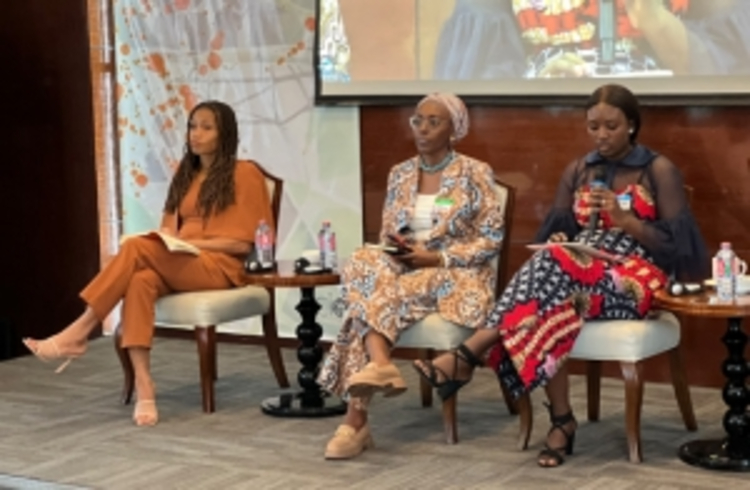Bright future for Africa’s agrifood sector

The 3rd African Agribusiness Leaders Dialogue (AALD3), held online and in person in Accra, has highlighted the barrier-breaking role of young African ‘agripreneurs’ in the agrifood sector.
Hosted by the Food and Agriculture Organization of the United Nations (FAO) Regional Office for Africa, AALD3 gathered perspectives from the private sector ahead of FAO’s 33rd Session of the Regional Conference for Africa (ARC33) to be held 18-20 April in Rabat, Morocco.
ARC33 will bring together Ministers of Agriculture and other relevant portfolios from across Africa to drive agenda-setting in agrifood systems transformation in Africa, and AALD3 will help to bring the private sector perspective to those discussions.
Emmanuel Tra Bi, Director General for Industry of the Ministry of Trade and Industry of the Republic of Côte d’Ivoire gave the opening remarks, highlighting the role strategic partnerships with the private sector can play in agrifood systems transformation.
“There is no longer any doubt that agrifood industry is a real source of wealth and sustainable employment for African economies. It is therefore up to African countries to work together in a spirit of solidarity and peace to consolidate the gains made in this sector,” he said.
Building on the importance of partnership, Tom Gambrah, who founded and runs the company Premium Foods in Ghana, said in his keynote address that the African private sector can play a critical role in driving sustainable, inclusive growth.
“By sharing experiences and insights we can help shape policies that will drive sustainable growth and inclusivity in Africa’s agrifood sector,” he said. “We have a tremendous opportunity to advocate for breaking trade barriers, advancing technology and market expansion.”
Trail-blazing young entrepreneurs in Africa’s agribusiness sector
The event included panel discussions with a range of business leaders, including young trail-blazing entrepreneurs in the agribusiness sector.
Affiong Williams, who runs Nigeria’s largest dried fruit company ReelFruit, said a key to her early success was partnering with like-minded entrepreneurs and learning from others in the region.
Sakina Usengimana, who runs Afri-Foods in Rwanda and is chairperson of the Rwanda Youth in Agri-Business Forum (RYAF), raised some of the challenges she faces in operating a cross-border business such as currency conversions, but praised Rwandan authorities for removing some trade barriers and creating a more supporting ecosystem for new agribusinesses.
“Removing barriers and creating ecosystem support for young agripreneurs is vital for agribusinesses to flourish,” she said.
Dzifa Amegashie from CalBank said women entrepreneurs often face an unconscious bias if they operate in the agribusiness sector, and that her bank has established a ‘women’s desk’ to better support women agripreneurs.
FAO Assistant Director-General and Regional Representative for Africa Abebe Haile-Gabriel highlighted emerging trends such as Africa’s demographic shift to a younger population, rapid urbanization, the projected growth of African food markets, the increasing integration of technological and digital innovations in Africa’s agrifood systems, and the promising prospects of the African Continental Free Trade Area (AfCFTA).
“We are encouraged by the rise of young entrepreneurs in the digital revolution, raising important and at times difficult questions and driving change,” he said. “The future for Africa’s agrifood systems is bright and in young agripreneurs’ hands. What I have heard today is really encouraging.”
Other speakers at the event were Aisata Guiro from Accelerate Africa, Maryanne Gichanga from AgriTech, Tenemba Anna Samaké from MBC Africa and the Aspen Network of Development Entrepreneurs (ANDE) West Africa Steering Committee, and Venan Sondo from Chaint Afrique.
Ready for ARC33
The 33rd FAO Regional Conference for Africa will put a spotlight on the FAO Strategic Framework 2022-2031 which encapsulates FAO’s work into the four betters: better production, better nutrition, a better environment, and a better life, leaving no one behind.
The conference theme is Resilient agrifood systems and inclusive rural transformation.
In readiness for ARC33, participants at AALD3 developed a private sector declaration that will be presented at the regional conference. It comes after African civil society organisations held a similar dialogue and developed a civil society declaration for ARC33.

